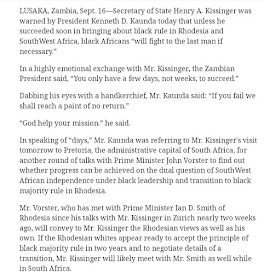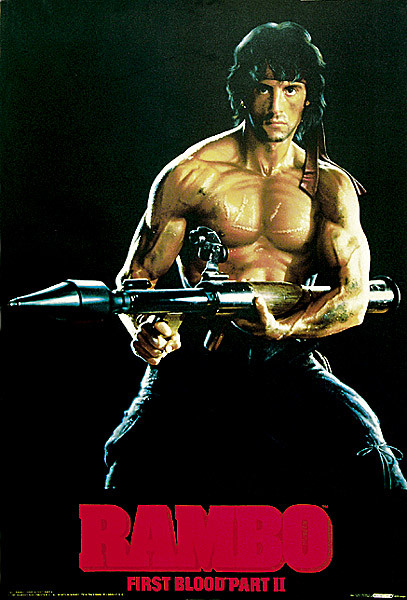The only two events listed in Wikipedia February 1976 events in the United States are
In 1972 Seymour Hersh started working at the New York times, and this is how he describes the NYT's relationship with Kissinger and the State Department at the time. From Sy Hersh and Anthony Bourdain on Kissinger
On 19th September 1976 AP put out this footage as Smith sat down to talks in Pretoria with Kissinger.
Then, a month or so later, Smith gave this interview where he explains how he had made a written agreement with Kissinger on military command remaining with the white government. And he explained that the black opposition leaders, including Robert Mugabe, with whom he was going to be talking to in Geneva had very little to do with the terrorists operating in the country, and certainly had no control over them. So he surely would have explained this to Kissinger in Pretoria, and that would have been a large part of the justification for the necessity of retaining control of the country's armed forces.
Here is another take on this meeting
With a few interesting comments
The significance of the last comment is that long before Kissinger started talks with the British and "Front Line" heads of state, sanctions against South Africa aiding the Rhodesian government were already in effect and the Rhodesian armed forces were having to make do with locally manufactured armaments like the "Hippo" APC, based on a Bedford truck chassis, and the "Pookie" mine detection vehicle. They also started manufacturing weapons locally.
Now look at what Kissinger was up to with the CIA in Argentina in October 1976. See Heinz Buttkissinger.
Two years later, in October 1978, talks in the United States showed quite how misguided the five point plan was. It was almost entirely divorced from reality. Here is Smith talking with Ndabaningi Sithole, who had been released in 1974, after having served a 10 year prison sentence for plotting to assassinate Ian Smith. Sithole confirms that the so-called "Patriotic Front" fighters in fact had no overall command tructure, and different factions were effectively at war with each other.
Later, in 2000, Mugabe was facing fierce opposition in Zimbabwe. This piece of film was from a visit Ian Smith made to Oxford.
Then in March 2002, Ian Smith was stripped of his Zimbabwean citizenship.
So what was behind Kisssinger's "diplomacy"? In 1975, the year before, the US had pulled out of the Vietnam War, and America was faced with the problem of tens of thousands of returning veterans, including many African-American soldiers. And Vietnam had been, shall we say, not the most disciplined military action the United States had been involved in. So America had not just a vet problem, but a race problem, a race problem on steroids, and armed to the teeth.
From https://www.vietnamwar50th.com/assets/1/7/African_Americans_in_the_Vietnam_War.pdf
This suggests, to the cynical, another motive behind McNamara's "Project 100,000". As well as being effectively a euthenasia programme, it may have also served to partially redress the balance in the racial demographic of those brought back from Vietnam in body bags. Whether or not that was intentional, McNamara was a fool not to have considered what the consequences of this disastrous idea of his could be after the war. Here is a talk by Hamilton Gregory, author of a book McNamara's Folly: The Use of Low-IQ Troops in the Vietnam War.
Now listen to Che Guevara addressing the UN General Assembley in New York in 1964.
He congratulates Zambia, Malawi and Malta on their newly acquired independence. Malawi's president was the dictator Hastings Banda, Zambia's was Kenneth Kaunda, and Malta had Queen Elizabeth II as its head of state. And it so happens that Henry Kissinger is a "knight of malta", or more properly, a member of the "Sovereign Military Hospitaller Order of Saint John of Jerusalem, of Rhodes and of Malta". Now I always thought that Rhodesia was named after its founder Cecil Rhodes. But maybe Cecil was named after the Greek island?
A week and a day later, René Barrientos gave the order that Che Guevara should be executed.
And finally, here's me paddling someone else's canoe on the Rio Lanza, in Rhodesia.
February 5 – Nearly 2,000 students become involved in a racially charged riot at Escambia High School in Pensacola, Florida; 30 students are injured in the 4-hour fray.
February 11 – Clifford Alexander, Jr. is confirmed as the first African-American Secretary of the United States Army.But, acording to this Wikipedia article
The United States Secretary of State, Henry Kissinger, announced a formal interest in the Rhodesian situation in February 1976, and spent the rest of the year holding discussions with the British, South African and Frontline governments to produce a mutually satisfactory proposal.
...
Smith met Kissinger in Pretoria on 18 September 1976 to discuss the terms. The American diplomat told the prime minister that although he was obliged to take part, his participation in what he termed the "demise of Rhodesia" was "one of the great tragedies of my life". All the same, he encouraged Smith strongly to accept the deal he placed on the table, though he knew it was unpalatable, as any future offer could only be worse. Western opinion was already "soft and decadent", Kissinger warned, and would become even more so if, as projected, American President Gerald Ford lost that year's presidential election to Jimmy Carter.But Kissinger was doing his "shuttle diplomacy" in the days leading up to the Pretoria meeting. According to this New York Times piece:
In 1972 Seymour Hersh started working at the New York times, and this is how he describes the NYT's relationship with Kissinger and the State Department at the time. From Sy Hersh and Anthony Bourdain on Kissinger
On 19th September 1976 AP put out this footage as Smith sat down to talks in Pretoria with Kissinger.
Then, a month or so later, Smith gave this interview where he explains how he had made a written agreement with Kissinger on military command remaining with the white government. And he explained that the black opposition leaders, including Robert Mugabe, with whom he was going to be talking to in Geneva had very little to do with the terrorists operating in the country, and certainly had no control over them. So he surely would have explained this to Kissinger in Pretoria, and that would have been a large part of the justification for the necessity of retaining control of the country's armed forces.
Here is another take on this meeting
With a few interesting comments
The significance of the last comment is that long before Kissinger started talks with the British and "Front Line" heads of state, sanctions against South Africa aiding the Rhodesian government were already in effect and the Rhodesian armed forces were having to make do with locally manufactured armaments like the "Hippo" APC, based on a Bedford truck chassis, and the "Pookie" mine detection vehicle. They also started manufacturing weapons locally.
Now look at what Kissinger was up to with the CIA in Argentina in October 1976. See Heinz Buttkissinger.
Two years later, in October 1978, talks in the United States showed quite how misguided the five point plan was. It was almost entirely divorced from reality. Here is Smith talking with Ndabaningi Sithole, who had been released in 1974, after having served a 10 year prison sentence for plotting to assassinate Ian Smith. Sithole confirms that the so-called "Patriotic Front" fighters in fact had no overall command tructure, and different factions were effectively at war with each other.
Later, in 2000, Mugabe was facing fierce opposition in Zimbabwe. This piece of film was from a visit Ian Smith made to Oxford.
Mugabe is calling for all whites who fought against black guerrillas to face trials for war crimes.
Mugabe has said the nation's 70,000 whites - less than 1 percent of the population of 13 million - mostly opposed his government and had spurned offers of forgiveness and reconciliation.
Smith rejected Mugabe's threat, saying that the blame for the violence lay squarely on Mugabe's shoulders.
"Well he is the one who should be put on trial for genocide isn't he, Mugabe -- not Smith."
"Well because he killed so many people, massacred them by the thousands, I mean Gurugundi and Matabeleland land, when he massacred 30,000 Matabeleles, I never remember massacring a single person in my life."
Then in March 2002, Ian Smith was stripped of his Zimbabwean citizenship.
So what was behind Kisssinger's "diplomacy"? In 1975, the year before, the US had pulled out of the Vietnam War, and America was faced with the problem of tens of thousands of returning veterans, including many African-American soldiers. And Vietnam had been, shall we say, not the most disciplined military action the United States had been involved in. So America had not just a vet problem, but a race problem, a race problem on steroids, and armed to the teeth.
From https://www.vietnamwar50th.com/assets/1/7/African_Americans_in_the_Vietnam_War.pdf
This suggests, to the cynical, another motive behind McNamara's "Project 100,000". As well as being effectively a euthenasia programme, it may have also served to partially redress the balance in the racial demographic of those brought back from Vietnam in body bags. Whether or not that was intentional, McNamara was a fool not to have considered what the consequences of this disastrous idea of his could be after the war. Here is a talk by Hamilton Gregory, author of a book McNamara's Folly: The Use of Low-IQ Troops in the Vietnam War.
Now listen to Che Guevara addressing the UN General Assembley in New York in 1964.
He congratulates Zambia, Malawi and Malta on their newly acquired independence. Malawi's president was the dictator Hastings Banda, Zambia's was Kenneth Kaunda, and Malta had Queen Elizabeth II as its head of state. And it so happens that Henry Kissinger is a "knight of malta", or more properly, a member of the "Sovereign Military Hospitaller Order of Saint John of Jerusalem, of Rhodes and of Malta". Now I always thought that Rhodesia was named after its founder Cecil Rhodes. But maybe Cecil was named after the Greek island?
Rhodes' nickname is The island of the Knights, named after the Knights of Saint John of Jerusalem, who once conquered the land.Lastly, listen to Ian Smith talking about Rhodesian independence on 1st October, 1967.
A week and a day later, René Barrientos gave the order that Che Guevara should be executed.
... on October 9, Bolivian President René Barrientos ordered that Guevara be killed. The order was relayed to the unit holding Guevara by Félix Rodríguez reportedly despite the United States government's desire that Guevara be taken to Panama for further interrogation.From Time Magazine, in 1968:
Cuban Revolutionary Che Guevara spent the last year of his life trying without success to topple the government of Bolivia. Ironically, Che has come close to doing in death what he could not achieve in life. Last week the 14-man Cabinet of Bolivia's President René Barrientos resigned in the embarrassed furor following the leak of Che's diary to his old boss, Fidel Castro.
Barrientos' troubles began two weeks ago, when his Minister of Government, Antonio Arguedas, fled abruptly to Chile. There he admitted giving the diary to Castro so that Fidel could be...So, Evo Morales, Alvaro Garcia Linera, what was that story I thought I read somewhere here, about Che's diary being found in Teoponte in 2008? Was that an extra diary?
And finally, here's me paddling someone else's canoe on the Rio Lanza, in Rhodesia.










No comments:
Post a Comment